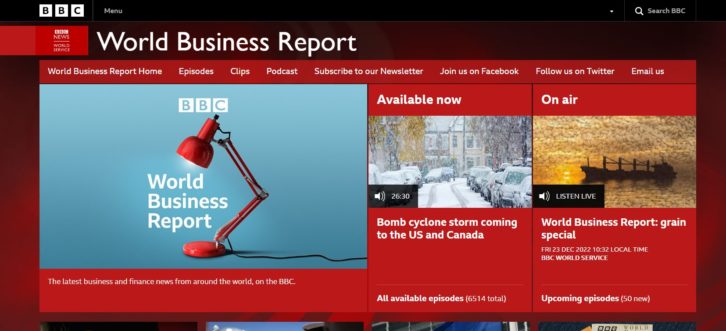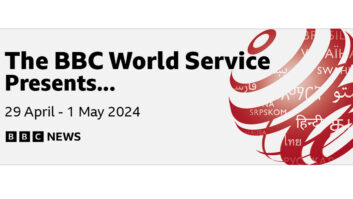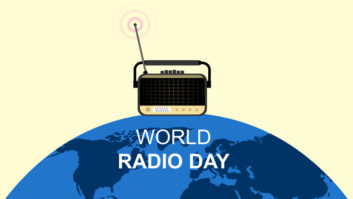In September the BBC World Service (BBCWS) announced significant service cuts and “around 382 post closures,” or job losses, as the once-powerful global shortwave radio broadcaster copes with its latest round of budget cuts.
“High inflation, soaring costs and a cash-flat Licence Fee settlement have led to tough choices across the BBC, and the BBC’s international services need to make a saving of £28.5 million, as part of the wider £500 million of annual savings and reinvestment to make the BBC digital-led,” the organization wrote in a news release.
“Digital-led” in this case translates to cutting shortwave services in favor of online content, which doesn’t require the hefty expense of power-hungry SW transmitters and expansive antenna farms. The BBCWS’ Arabic, Persian, Kyrgyz, Uzbek, Hindi, Bengali, Chinese, Indonesian, Tamil and Urdu radio broadcasts were cancelled.
Although shortwave broadcasts from BBC News services will continue in Afaan Oromoo, Amharic, Burmese, Dari, French, Hausa, Korean, Pashto, Somali, Tigrinya, Kinyarwanda and Kirundi, the service cuts are another major blow to shortwave’s reputation as a source for reliable global news and information accessible by cheap, hard-to-block radio receivers.
The cuts are the latest in a long-running move away from global airwaves. In 2011 about 650 BBCWS jobs were lost due to budget cuts. “Radio broadcasts in China, Russia, Ukraine and Turkey will be axed, and shortwave broadcasts will cease in Hindi,” the Guardian news website reported at the time. BBCWS had cancelled direct English-language SW broadcasts to North America in 2001.
The Russian invasion of Ukraine did motivate the BBCWS to resume four hours daily of English service, though not in Ukrainian or Russian, to Eastern Europe in 2022.

Anticipated loss
Resigned acceptance was the uniform reaction among observers of the international radio scene.
“Unfortunately, I am not greatly surprised,” said Jeff White, co-founder and general manager of WRMI in Okeechobee, Fla., the largest privately-owned shortwave station in the western hemisphere. “This is a continuation of cuts by the BBCWS and many other ‘government’ shortwave stations around the world in recent years who think that they can save money by eliminating shortwave and replacing it with only an internet service.”
Gilles Letourneau, influencer on the OfficialSWLchannel on YouTube and co-host of the weekly International Radio Report program, said, “With the licence fees going away, it is obvious they needed to find money somewhere.”
“This was predictable given the licence fee losses,” said Dan Robinson, former Voice of America White House and foreign correspondent.
“Honestly, no reaction,” said former international broadcaster Keith Perron. “Except it was about time.”
[Sign Up for Radio World’s SmartBrief Newsletter]
“VPNs get around this”
As readers well know, the value of SW broadcasting has been a topic of debate for years, revived recently with the deployment of some service into Russia and Ukraine by state broadcasters as well as publicly funded groups using pay-for-airtime transmission facilities such as those offered by WRMI.
Supporters of shortwave’s use in the 21st century generally will point out that it is the only medium that can cut through censorship imposed by China, Russia and other countries that tightly control domestic internet, radio and TV traffic.
More commonly expressed, though, is the opinion that shortwave’s use is limited to a small group of hobbyists while pretty much everybody has moved to the internet. State censorship, they say, can be outwitted using Virtual Private Networks and the Dark Web; they see no reason to spend big money to maintain the medium.
However, “A digital-only world is great if it goes through,” said Letourneau. “The problem is that many countries have little access to the internet, and China blocks the BBC online. Without shortwave radio, the Chinese population will be left in the dark.”
“The cuts will be severe,” said Sheldon Harvey, president of the Canadian International DX Club, a SW listening hobbyists’ association. “Many Arabic and Chinese language speakers access BBC, both in their languages and in English, via radio, and they may not have access to digital services.”
But Robinson and Keith, both of whom have deep roots in SW radio and an undeniable love of the medium, see the matter differently.
“At first glance, BBC’s halt in radio output in 10 languages, including Chinese, Hindi, Arabic as well as Persian, might appear draconian,” said Robinson. “But one has to question the extent to which the BBC, or the U.S.-funded U.S. Agency for Global Media [which operates the VOA], actually had large numbers of listeners in these target areas.”
“I can’t speak for the Arabic world,” Perron said. “But for the Chinese world, it won’t make much of a difference, as people in China want news from sources other than CCTV, CNR or print. The Chinese do block certain foreign news websites, but it is futile. VPNs get around this. And then you have other apps where BBC News content is available, such as the BBC Chinese TikTok channel, Telegram and YouTube, as well as many more.”
Yet John Figliozi, editor of the Worldwide Listening Guide, said that while he appreciates the point about VPNs, “That is risky in places like China that are always doubling down on restricting access to ‘unapproved’ media sources. Shortwave’s most important attribute today beyond its free availability is its ability to punch through interdiction efforts anonymously.”
[Visit Radio World’s Global News Page]
Soft power
One of the values of the BBCWS during the Cold War — along with vanished SW broadcasters such as Radio Canada International, Radio Netherlands Worldwide and Radio Moscow — was its ability to serve as a form of extension of influence of its government.
“Every time they make more of these cuts, it diminishes the diplomatic soft power of the BBC,” said White. “This panoply of cuts will diminish it greatly.”
“The BBCWS likes to call themselves the World’s Radio Station,” Letourneau said. “Unfortunately, by cutting service to a big part of the world population, it is less true.”
But governments have been cutting international SW broadcasting as far back as the 1990s, when the Cold War was believed to have been “won.” Compared to the 1980s, today’s airwaves offer far fewer program choices save for diehards such as Radio Havana Cuba, Radio Romania International and Radio New Zealand Pacific, along with private stations such as WRMI and a host of religious broadcasters.
The steep drop in choice has motivated many former listeners to move to TV and the web. Critics say the trend also has stunted the use of the Digital Radio Mondiale transmission standard on shortwave, which remedies the static, signal fading and poor audio quality of analog SW broadcasts.
Because of the lack of audience, Perron — whose SW broadcast credits include Radio Canada International, Radio Havana Cuba, Radio Netherlands, Deutsche Welle Africa Service, China Radio International and the BBC World Service in three languages — thinks the notion of soft power is of little consequence.
“If you had asked me about this in 2010, I would have said that this is the wrong time,” Perron told Radio World, but now, “It’s a very good decision. If the BBCWS wants to continue to be relevant, this needs to be done. Compared to others, the BBC has been very slow in this regard, and they are finally catching up.”
Yet longtime SW devotee Sheldon Harvey counters that despite the spread of the web and mobile phones, “millions of people on the planet still rely on radio for news, information, entertainment and education. More and more each day, people are losing access to this important medium.”
Meanwhile, a subsequent development in December would seem to suggest that hoping for an expansion of BBC OTA services in any form is probably forlorn.
BBC Director-General Tim Davie gave a speech before the Royal Television Society in which he said the United Kingdom and the BBC must begin work today to prepare for an internet-only future.
“For the BBC, internet-only distribution is an opportunity to connect more deeply with our audiences and to provide them with better services and choice than broadcast allows. It provides a significant editorial opportunities. A switch-off of broadcast will and should happen over time, and we should be active in planning for it.”







